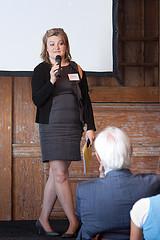 Although the especificidades of the actions of sanitary monitoring to be come back toward the regulation of products and services the opening of spaces of interlocution with the half academic for the production of scientific research and the recognition of it is important as part of the collective health, in view of, its multiprofessional character, intersetorial and to interdisciplinar. Developed educative actions in the scope of the sanitary monitoring are restricted and happen of sporadical and prompt form. One of the main challenges of the sanitary construction is to not only promote the access to the information for all the population and for part of it. The sanitary monitoring must assume its role of promotion and protection of the health through the dissemination of information on the quality of products and services, mainly the public, disponibilizados for the population that if finds in situation of sanitary vulnerability. It is charged of the private sector, but as it is the quality of the public service of health? Many professionals of odontologia know only the side regulating of the sanitary monitoring. In virtue of this, the importance of the development of activities of construction of the sanitary conscience.
Although the especificidades of the actions of sanitary monitoring to be come back toward the regulation of products and services the opening of spaces of interlocution with the half academic for the production of scientific research and the recognition of it is important as part of the collective health, in view of, its multiprofessional character, intersetorial and to interdisciplinar. Developed educative actions in the scope of the sanitary monitoring are restricted and happen of sporadical and prompt form. One of the main challenges of the sanitary construction is to not only promote the access to the information for all the population and for part of it. The sanitary monitoring must assume its role of promotion and protection of the health through the dissemination of information on the quality of products and services, mainly the public, disponibilizados for the population that if finds in situation of sanitary vulnerability. It is charged of the private sector, but as it is the quality of the public service of health? Many professionals of odontologia know only the side regulating of the sanitary monitoring. In virtue of this, the importance of the development of activities of construction of the sanitary conscience.
Another aspect is that the majority of the Brazilian cities does not possess a dentist in the team of sanitary monitoring. Nor therefore the actions of regulation in Establishments of Odontolgica Assistance leave of being executed although the especificidade of the activities odontolgicas. What it strengthens that the sanitary monitoring can and must extend its fan of performance and include in its method of work actions that stimulate the dialogue and the exchange of experiences between professionals of health and society serving as interlocutor of this process. This triangulation between society, sanitary monitoring and university constitutes an important space for the construction of the sanitary conscience. Therefore, the transmission of the technician-scientific knowledge cannot be considered as one benesse assistencial or act of favor of its detainers, as much of being able as of the knowledge. The people must have access easy, opportune, and understandable the data and information, that must be clear, without containing ambiguity, necessary, trustworth and transmitted of adjusted form, through visual and auditory systems that mobilize the attention and motivate its use. The actions of sanitary education must contribute, decisively, to transform the duty of State in state of having, that it is function of all: individuals.